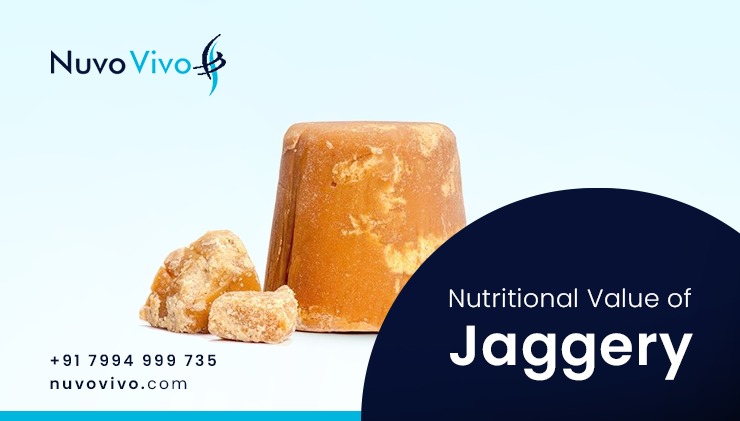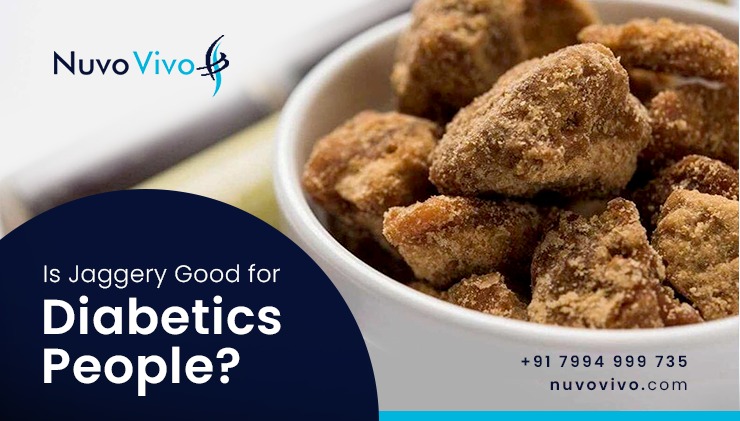We all crave a little sweetness now and then, but the worry of ill-health constantly accompanies this desire.
Indeed, sugar should be avoided at all costs – if at all feasible – because its disadvantages outweigh its potential benefits.
However, if you still feel the urge to eat anything sweet, don’t give in to it; instead, try a safer substitute like jaggery.
But, the question is, is jaggery good for diabetics? Don’t worry, and you will soon have an answer!
What is Jaggery?
Jaggery (also known as gur) is a popular sweetener in Africa and Southeast Asia. It’s a form of sugar that hasn’t been overly refined, so there’s still a lot of molasses in it.
Jaggery is frequently promoted as being “healthier” than other sugars. While scientists have backed up some of these claims, research on the overall medical benefits and hazards of jaggery is ongoing.
ALSO READ: Sugar vs Jaggery vs Honey
Nutritional Value of Jaggery

A quarter-cup serving of jaggery contains:
- Calories: 100
- Protein: Less than 1 gram
- Fat: Less than 1 gram
- Carbohydrates: 26 grams
- Fiber: Less than 1 gram
- Sugar: 24 grams
Jaggery also contains:
- Calcium
- Magnesium
- Potassium
- Phosphorus
For a plant product, jaggery is a good supplier of iron. A single dish of jaggery may provide over ten percent of the daily iron requirement.
Iron is necessary for the maintenance of healthy blood cells. Increasing your iron intake can help you feel less tired and improve your muscular function.
Because of its many medicinal characteristics, jaggery or palm jaggery, whether made from sugarcane juice or palm juice, is regarded as healthier than refined sugar. In India, Sri Lanka, Nepal, and Pakistan, both types of jaggery are widely used.
This natural sweetener is made up of a unique blend of sucrose, inverted sugars, and other residual ingredients such as wood ash, proteins, and bagasse fiber, as well as a significant amount of moisture.
It is nothing but unprocessed sugar that comes in the shape of semi-solid rocks or powder. It is known as gur in Hindi, bellam in Telugu, Vellam in Tamil, Bella in Kannada, Sharkara in Malayalam, and Gul in Marathi.
ALSO READ: How Safe Are Artificial Sweetners?
Types of Jaggery
Jaggery is a form of unprocessed sugar (molasses) derived from sugarcane juice, palm sap, or coconut sap. The different types include:
Sugarcane Jaggery
The most generally used type of jaggery is brown. It is unrefined sugarcane juice derived from sugarcane that is manually produced using ancient procedures, giving it a distinct taste and texture.
This jaggery is typically enjoyed in its crystallized form, prepared by boiling, churning, and sifting it using age-old procedures.
Palm Jaggery
Palm jaggery is a sweeter type of jaggery with a melt-in-your-mouth quality. This type of jaggery is created by extracting palm sap, then cooked and churned by hand.
The sweetness and the nutritional benefits of dates are combined in this jaggery.
Coconut Jaggery
This is a different type of jaggery that is commonly seen in Southern Indian dishes. This jaggery is sweet and crystalline and is made from unfiltered and unfermented coconut sap extracts.
When compared to both jaggery varieties, it has a sweeter flavor. This is the healthiest jaggery of all three because it is rich in antioxidants and other vital minerals.
How is Jaggery Made?
This great sweetener was made by crushing sugarcane/palm/coconut sap with oxen-powered or electric juice crushers for many decades. After that, the liquid is collected in big jars. The farmers would then pour the necessary juice into the smaller vessel and heat it in the furnace using the dried wood as fuel.
Lime is added as the juice reaches a boiling point to eliminate contaminants such as wood that float to the top and collect. The mixture is then placed into a shallow, flat-bottomed pot to cool entirely.
The fluid thickens, turns gold, and begins to form threads when continually swirled. When it reaches room temperature, it becomes semi-solid and may be molded into desired shapes such as square or circular blocks.
ALSO READ: Stevia – A Sugar Substitute
Health Benefits of Jaggery

Jaggery is a sweetener that is gaining popularity as a “healthy” sugar substitute. This sweetener does have some health benefits. It’s also known as a “superfood sweetener.”
Let us have a look at the health benefits of eating jaggery:
Carbohydrate with a Bit of Benefit
Jaggery is a rich source of carbohydrates, which the body needs for energy production.
On the other hand, jaggery has a slightly more complicated carbohydrate type than simple sugar, which has a basic form that quickly breaks down to provide instant energy. This slows the energy release by a tiny bit and distributes it across a little more extended period.
Helps in Proper Digestion
As compared to table sugar, jaggery has some amount of fiber, which helps with bowel motions and relieves constipation. It also activates digestive enzymes and improves digestive functions, lowering gut pressure.
Detoxes the Liver
Your body can be cleansed and detoxified with a small block of jaggery. It aids in the natural removal of toxins from the body, which assists in the liver’s detoxification.
Apart from that, consuming jaggery can help to purify your blood and strengthen your immune system.
Mineral Depositories
Minerals such as iron, magnesium, calcium, and phosphorus are abundant in jaggery, especially when prepared traditionally or organically. It preserves all of the original minerals because it is made from sugarcane juice that has not been refined or bleached.
Antioxidant Rich Food
Jaggery contains selenium, magnesium, and specific vitamins with antioxidant effects. This allows jaggery to protect the body against harmful free radicals and may prevent some types of cancer and skin damage.
Aids in the Prevention of Anemia
Jaggery is abundant in minerals such as iron and phosphorus, which aid in producing hemoglobin in the body.
For people who have a low iron intake or are in danger of developing iron deficiency anemia, using jaggery is an effective preventative strategy.
Anti Allergen
Jaggery is used to treat allergic asthma, lung infections, sore throats, and other ailments. It is used in Ayurveda to treat respiratory problems.
There are a variety of delicious ways to incorporate jaggery powder into your diet. Here are some ideas for using jaggery powder to improve the flavor of certain common foods:
- You can use jaggery powder instead of sugar in your tea or milk.
- Add some powdered jaggery or a tiny chunk of jaggery to your ragi malt or oats for breakfast.
- If you’re making sweet meals at home, such as kheer, instead of sugar, use jaggery.
Benefits of Jaggery in Ayurveda
Gur, also known as jaggery, is mentioned in ancient Ayurvedic writings and is a crucial ingredient in Ayurvedic remedies, particularly those prepared in liquid forms, such as Arishtas and Asavas.
Regular consumption of washed and cleansed jaggery reduces Kapha dosha and acts as a diuretic, according to the Ayurvedic text Ashtanga Hrudayam Sutrasthana.
On the other hand, unrefined jaggery balances the Vata and Pitta doshas while also acting as an improved blood circulation purifier, antidepressant, and blood purifier. Dhauta Guda, also known as washed jaggery, helps to eliminate toxins and balance the pitta doshas.
Ayurvedic practitioners highly advise using jaggery to aid digestion, cleanse the gastrointestinal tract, urinary bladder, improve heart function, and combat anemia.
Dhauta is the liquid form of the sweetener, and it has varying qualities depending on how it is prepared.
For example, dhauta is known as Matsyandika in the form of unrefined sugar, but Khanda in sugar candy and sugar when refined. Gur is a critical ingredient in various Ayurvedic remedies, including tonics and jams (lehyams).
What is Diabetics?
Many people are unaware that diet control is an integral part of diabetes treatment, particularly for meals that cause a rapid rise in blood sugar levels.
An increase in blood glucose levels is referred to as hyperglycemia. Because of this, most diabetics are recommended to absolutely avoid sweets, desserts, and any other sugar-containing foods.
Is Jaggery Suitable for People with Diabetes?
Before incorporating jaggery into a diabetic’s diet, they must examine the glycemic index of jaggery.
Sugar and jaggery both come from the same plant: sugarcane. Both sugar and jaggery have a high glycemic index. It is not advised to consume jaggery if you have diabetes.
Jaggery consists of a lot of sugar in the form of sucrose. When compared to sugar, jaggery has a lot more nutrients.
However, despite its excellent nutritional content, jaggery also has a high glycemic index. The glycemic index of jaggery is 84.1.
If you have diabetes, this amount is more than enough to cause a blood sugar increase, which is terrible for your health. Thus, jaggery for diabetics is not endorsed but can be limited to sweet cravings.
ALSO READ: Diabetes Food Chart
Can a Diabetic Person Consume Jaggery?
When it comes to the usage of jaggery for diabetic patients, there are a variety of viewpoints. Some people believe that jaggery causes diabetes, while others believe that jaggery is beneficial to people with diabetes.
What do the experts have to say about it? What are other substitutes can a diabetic patient use? Can a diabetic patient eat dates?
If you have diabetes and assume that jaggery for diabetes fits you better than sugar, you’re mistaken, as jaggery for sugar patients is not recommendable.
Jaggery is useful for fulfilling sweet cravings, but don’t overuse it because it might cause blood sugar levels to rise.
So, what are your options? Continue to be healthy! Incorporate organic honey and homegrown stevia leaves into your diet. Dates are also a great substitute that includes various types of antioxidants that can help prevent heart disease and cancer and be a high-fiber protein snack.
NuvoVivo is an online health, wellness & fitness center that is into medical fitness & lifestyle management. We specialize in transformation (weight loss, muscle gain) and also in managing lifestyle conditions such as diabetes management, cholesterol, thyroid, PCOD and PCOS management, fatty liver, uric acid, hypertension, etc through nutrition & exercises. Our programs are all online, and our clients are from across the world to manage such lifestyle disorders, lose weight, etc. For more details, Contact us at +91 79949 99914


This Post Has One Comment
Wow.. . Great insights